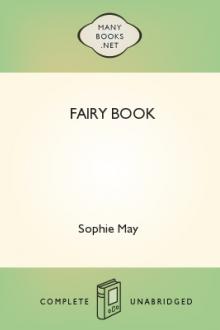The Roots of the Mountains<br />Wherein Is Told Somewhat of the Lives of the Men of Burgdale, Their by William Morris (best sales books of all time .txt) 📗

- Author: William Morris
Book online «The Roots of the Mountains<br />Wherein Is Told Somewhat of the Lives of the Men of Burgdale, Their by William Morris (best sales books of all time .txt) 📗». Author William Morris
p. 272In a while they arose and turned homeward, and went over the open meadow, and it was yet early, and the dew was as heavy on the grass as before, though the wide sunlight was now upon it, glittering on the wet blades, and shining through the bells of the chequered daffodils till they looked like gouts of blood.
‘Look,’ said Sun-beam, as they went along by the same way whereas they came, ‘deemest thou not that other speech-friends besides us have been abroad to talk together apart on this morning of the eve of battle. It is nought unwonted, that we do, even though we forget the trouble of the people to think of our own joy for a while.’
The smile died out of her face as she spoke, and she said:
‘O friend, this much may I say for myself in all sooth, that indeed I would die for the kindred and its good days, nor falter therein; but if I am to die, might I but die in thine arms!’
He looked very lovingly on her, and put his arm about her and kissed her and said: ‘What ails us to stand in the doom-ring and bear witness against ourselves before the kindred? Now I will say, that whatsoever the kindred may or can call upon me to do, that will I do, nor grudge the deed: I am sackless before them. But that is true which I spake to thee when we came together up out of Shadowy Vale, to wit, that I am no strifeful man, but a peaceful; and I look to it to win through this war, and find on the other side either death, or life amongst a happy folk; and I deem that this is mostly the mind of our people.’
She said: ‘Thou shalt not die, thou shalt not die!’
‘Mayhappen not,’ he said; ‘yet yesterday I could not but look into the slaughter to come, and it seemed to me a grim thing, and darkened the day for me; and I grew acold as a man walking with the dead. But tell me: thou sayest I shall not die; dost thou say this only because I am become dear to thee, or dost thou speak it out of thy foresight of things to come?’
She stopped and looked silently a while over the meadows towards the houses of the Thorp: they were standing now on p. 273the border of a shallow brook that ran down toward the Weltering Water; it had a little strand of fine sand like the sea-shore, driven close together, and all moist, because that brook was used to flood the meadow for the feeding of the grass; and the last evening the hatches which held up the water had been drawn, so that much had ebbed away and left the strand aforesaid.
After a while the Sun-beam turned to Face-of-god, and she was become somewhat pale; she said:
‘Nay, I have striven to see, and can see nought save the picture of hope and fear that I make for myself. So it oft befalleth foreseeing women, that the love of a man cloudeth their vision. Be content, dear friend; it is for life or death; but whichso it be, the same for me and thee together?’
‘Yea,’ he said, ‘and well content I am; so now let each of us trust in the other to be both good and dear, even as I trusted in thee the first hour that I looked on thee.’
‘It is well,’ she said; ‘it is well. How fair thou art; and how fair is the morn, and this our Dale in the goodly season; and all this abideth us when the battle is over.’
Once more her voice became sweet and wheedling, and the smile lit up her face again, and she pointed down to the sand with her finger, and said:
‘See thou! Here indeed have other lovers passed by across the brook. Shall we wish them good luck?’
He laughed and looked down on the sand, and said:
‘Thou art in haste to make a story up. Indeed I see that these first footprints are of a woman, for no carle of the Dale has a foot as small; for we be tall fellows; and these others withal are a man’s footprints; and if they showed that they had been walking side by side, simple had been thy tale; but so it is not. I cannot say that these two pairs of feet went over the brook within five minutes of each other; but sure it is that they could not have been faring side by side. Well, belike they were lovers bickering, and we may wish them luck out of that. Truly p. 274it is well seen that Bow-may hath done thine hunting for thee, dear friend; or else wouldest thou have lacked venison; for thou hast no hunter’s eye.’
‘Well,’ she said, ‘but wish them luck, and give me thine hand upon it.’
He took her hand, and fondled it, and said: ‘By this hand of my speech-friend, I wish these twain all luck, in love and in leisure, in faring and fighting, in sowing and samming, in getting and giving. Is it well enough wished? If so it be, then come thy ways, dear friend; for the day’s work is at hand.’
‘It is well wished,’ she said. ‘Now hearken: by the valiant hand of the War-leader, by the hand that shall unloose my girdle, I wish these twain to be as happy as we be.’
He made as if to draw her away, but she hung aback to set the print of her foot beside the woman’s foot, and then they went on together, and soon crossed the Bridge, and came home to the House of the Face.
When they had broken their fast, Face-of-god would straight get to his business of ordering matters for the warfare, and was wishful to speak with Folk-might; but found him not, either in the House or the street. But a man said:
‘I saw the tall Guest come abroad from the House and go toward the Bridge very early in the morning.’
The Sun-beam, who was anigh when that was spoken, heard it and smiled, and said: ‘Gold-mane, deemest thou that it was my brother whom we blessed?’
‘I wot not,’ he said; ‘but I would he were here, for this gear must speedily be looked to.’
Nevertheless it was nigh an hour before Folk-might came home to the House. He strode in lightly and gaily, and shaking the crest of his war-helm as he went. He looked friendly on Face-of-god, and said to him:
‘Thou hast been seeking me, War-leader; but grudge it not that I have caused thee to tarry. For as things have gone, I am p. 275twice the man for thine helping that I was yester-eve; and thou art so ready and deft, that all will be done in due time.’
He looked as if he would have had Face-of-god ask of him what made him so fain, but Face-of-god said only:
‘I am glad of thy gladness; but now let us dally no longer, for I have many folk to see to-day and much to set a-going.’
So therewith they spake together a while, and then went their ways together toward Carlstead and the Woodlanders.
CHAPTER XXXVI. FOLK-MIGHT SPEAKETH WITH THE BRIDE.It must be told that those footprints which Face-of-god and the Sun-beam had blessed betwixt jest and earnest had more to do with them than they wotted of. For Folk-might, who had had many thoughts and longings since he had seen the Bride again, rose up early about sunrise, and went out-a-doors, and wandered about the Burg, letting his eyes stray over the goodly stone houses and their trim gardens, yet noting them little, since the Bride was not there.
At last he came to where there was an open place, straight-sided, longer than it was wide, with a wall on each side of it, over which showed the blossomed boughs of pear and cherry and plum-trees: on either hand before the wall was a row of great lindens, now showing their first tender green, especially on their lower twigs, where they were sheltered by the wall. At the nether end of this place Folk-might saw a grey stone house, and he went towards it betwixt the lindens, for it seemed right great, and presently was but a score of paces from its door, and as yet there was no man, carle or queen, stirring about it.
It was a long low house with a very steep roof; but belike the hall was built over some undercroft, for many steps went up to the door on either hand; and the doorway was low, with a p. 276straight lintel under its arch. This house, like the House of the Face, seemed ancient and somewhat strange, and Folk-might could not choose but take note of it. The front was all of good ashlar work, but it was carven all over, without heed being paid to the joints of the stones, into one picture of a flowery meadow, with tall trees and bushes in it, and fowl perched in the trees and running through the grass, and sheep and kine and oxen and horses feeding down the meadow; and over the door at the top of the stair was wrought a great steer bigger than all the other neat, whose head was turned toward the sun-rising and uplifted with open mouth, as though he were lowing aloud. Exceeding fair seemed that house to Folk-might, and as though it were the dwelling of some great kindred.
But he had scarce gone over it with his eyes, and was just about to draw nigher yet to it, when the door at the top of those steps opened, and a woman came out of the house clad in a green kirtle and a gown of brazil, with a golden-hilted sword girt to her side. Folk-might saw at once that it was the Bride, and drew aback behind one of the trees so that she might not see him, if she had not already seen him, as it seemed not that she had, for she stayed but for a moment on the top of the stair, looking out down the tree-rows, and then came down the stair and went soberly along the road, passing so close to Folk-might that he could see the fashion of her beauty closely, as one looks into the work of some deftest artificer. Then it came suddenly into his head that he would follow her and see whither she was wending. ‘At least,’ said he to himself, ‘if I come not to speech with her, I shall be nigh unto her, and shall see somewhat of her beauty.’
So he came out quietly from behind the tree, and followed her softly; and he was clad in no garment save his kirtle, and bare no weapons to clash and jingle, though he had his helm on his head for lack of a softer hat. He kept her well in sight, and she went straight onward and looked not back. She went by the way p. 277whereas he had come, till they were in the main street, wherein as yet was no one afoot; she made her way to the Bridge, and passed over it into the meadows; but when she had gone but a few steps, she stayed a little and looked on the ground, and as she did so turned a little toward Folk-might, who had drawn back into the last of the refuges over the up-stream buttresses. He saw that there was a half-smile on her face, but he could not tell whether she were glad or sorry. A light wind was beginning to blow, that stirred her raiment and raised a lock of hair that had strayed from the golden fillet round about her head, and she looked most marvellous fair.
Now she looked along the grass that glittered under the beams of the newly-risen sun, and noted belike how heavy the dew lay on it; and the grass was high already, for the spring had been hot, and haysel would be early in the Dale. So she put off her shoes, that were of deerskin and broidered with golden threads, and turned somewhat from the way, and hung them up amidst the new green leaves of a hawthorn bush that stood nearby, and so went thwart the meadow somewhat eastward straight from that bush, and her feet shone out like pearls amidst the deep green grass.
Folk-might followed presently, and she stayed not again, nor turned, nor beheld him; he recked not if she had, for then would he have come up with her and hailed her, and he knew that she was no foolish maiden to start at the sight of a man who was the friend of her Folk.
So they went their ways till she came to the strand of the water-meadow brook aforesaid, and she went through the





Comments (0)